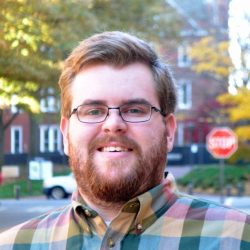 |
| Ryan Armstrong |
Ryan Armstrong, M.S. AE '16
After graduation, what's your next adventure?
I will be going to Fort Worth, Texas to work for Lockheed Martin at Skunk Works. I will be a systems engineer doing operations analysis. I’ll be quantifying the impact of new technologies and operational concepts. I’ll be doing force mix calculations, which essentially looks at a fleet and determines, economically, what mix of technologies are needed to accomplish the mission. You might say, at first, send in all of your new systems, but you have to ask yourself what the ROI is. Maybe a different mix of older and newer will accomplish the same thing at a lower cost.
What about your next adventure are you most excited about?
I knew when I came to Tech that I wanted to affect the future of aircraft and flight. Skunk Works is on the cutting edge of just that – doing it every day. It’s exciting, because you get to play with stuff when it’s just an idea floating around there. But it also takes confidence in your knowledge. The design process has a lot of steps, and people pour themselves into that. Somewhere along the line, someone like me has to come in and say ‘Great, but does it add value? Is it worth it?’ And that’s when you’ve got to be willing to call someone’s baby ‘ugly.’ That’s hard.
Did you have any previous co-op internship or research experience that helped you get to this point? I worked at Lockheed Martin before I came to Tech as a systems engineer. I did supplier statements of work. The summer after I came to Tech I interned at Skunk Works as an operations analyst and there it was: the dream job I never knew I wanted. It is exactly why I came to Tech. At the end of that summer, I told them I was going back to Tech to pursue a PhD, and they said ‘You can do that, but you already have this job.’
How did your educational experience at Georgia Tech help you achieve your goal?
As an undergraduate at Texas Tech, I was a mechanical engineering major. Now ME is good in a lot of areas, but it tends more toward detail design where AE is more conceptual design, coming up with a shape and a goal. So when I came to Georgia Tech I had a lot of catching up to do. I was so impressed with how Professor [Dimitri] Mavris knew where to place me. Within a week, he knew what I was good at and where my weaknesses were. He threw me into things that scared me, but he also put me in with a team that was a perfect fit. I saw my first helicopter, up close, when I got to Tech and I thought ‘That’s neat. I have no idea how it works.’ Eight months later, I presented a paper on it in front of the American Helicopter Society.
What advice would you give a student who was thinking about following your steps at Georgia Tech's aerospace engineering school? First piece of advice I’d give anyone coming to Tech is: don’t say ‘no’ to something just because it’s new or you don’t understand it at first. I remember one of my projects involved UAVs for the US Special Ops Command. There was some electrical engineering and controls stuff that was really outside my comfort zone. Dr. Mavris knew that – it’s probably why he assigned me. And I’m better for it. It built my confidence and helped me every time I had to go into a project and learn new material. The other piece of advice I’d give is: believe in yourself. Georgia Tech’s ranking can rattle you. Coming here from Texas, which was a good school, I was still wondering if I belonged here. I did, and I’m glad that I stuck it out because, through Dr. Mavris, I saw the importance of building a strong team, with different skills and abilities spread out across different individuals.
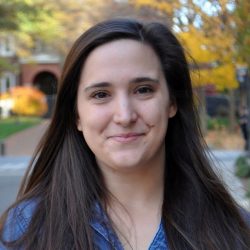 |
| Elizabeth Balga |
Elizabeth Balga, B.S.AE '16
After graduation, what's your next adventure?
Immediately after graduation, I’m going to Huntsville to do an internship working with the Ground Based Mid-course Defense. In July, I will start a rotational career program at Boeing – the Engineering Career Foundations Program in southern California. I will be working in space, but that’s all I know right now. All together, I will have four rotations, six months each, over the next two years, so I’ll get a chance to see all of the stages in the design process.
What about your next adventure are you most excited about?
To start out working in California will be nice, but the big thing with this rotational program is getting the opportunity to work with, and be mentored by, executives in the industry. Because I’ll be moving through different projects, I might not gain the same technical depth as some others, but I’ll definitely understand how the aerospace industry works at a higher level. It will broaden my horizons, too. I would probably never opt to do commercial aircraft because I’ve always been more interested in space and in defense. But commercial aircraft is a big part of Boeing, and, because I’ll be compelled to work in that area, I’ll come out a better engineer.
Did you have any previous co-op internship or research experience that helped you get to this point?
When I first came to Georgia Tech, I did some research in the Aerospace Systems Design Lab – working on the Navel Educational Engineering Center. That got my feet wet, showed me how to how to apply analytic methods to solve an engineering problem. That helped a lot when I went for my first internship interview at Boeing, because they wanted to know how I attacked problems. I did my first internship with Boeing the summer after my sophomore year in Huntsville, working on loads and dynamics analysis through Boeing’s Accelerated Hiring Program. They flew me out to Seattle to interview my potential managers. Junior year I began working on the RECONSO mission at Tech, in the flight software group that worked on systems operations and health. After junior year I did an internship with Boeing on their Space Launch System (SLS), where I did a lot of finite element analysis. I liked the content of this internship a lot because I wasn’t pigeon-holed. I had broad interests. I also interned as a junior engineer during the spring of 2015 with an Atlanta-based firm, Generation Orbit Launch Services, which is headed up by a former AE professor, John Olds. I created test platforms for slosh mechanics. I got to cut things out and put things together using CAD.
How did your educational experience at Georgia Tech help you achieve your goal?
My research and internship experiences gave me great insight on leadership that I will use for my entire career. I may not be top in all areas, but leadership means you are able to recognize that and then find the people who are the top performers. Tech gave me opportunities to practice leadership through outside activities, too. My senior year, I was president of MOVE, the oldest and largest volunteer service organization on campus, I was inducted into a leadership society, Omicron Delta Kappa, and I served as president of the student chapter of AIAA. I also served as secretary of the Atlanta Section of AIAA.
What advice would you give a student who was thinking about following your steps at Georgia Tech's aerospace engineering school?
If you find yourself telling yourself that you’re not good enough to do something, don’t believe it. Instead, use it as a challenge. I learned to do that. If I thought I couldn’t do something, I made myself do it. Even if I wasn’t the number one engineer on the project, I learned a lot of things I didn’t know. Have the audacity to try at the very least. That will give you a leg up the next time.
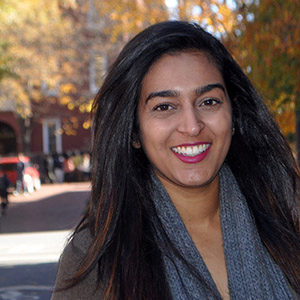 |
| Harleen Brar |
Harleen Brar, B.S.AE '16
After graduation, what's your next adventure?
I’m a BS/MS student, so I’m coming back to grad school to work with Dr. [Evangelos] Theodorou. Eventually, I think, I’d like to get a PhD in machine learning.
What about your next adventure are you most excited about?
Learning more from our research. The project we’re working on is interesting because we are using two different concepts to model and control. We’re comparing them to see if we can control epileptic seizures. My mother told me that she was proud to know that the work I was doing would make other people's lives better.
Did you have any previous co-op internship or research experience that helped you get to this point?
I did an internship with Northrop Grumman last summer, but mostly I've been involved in research. My first research experience was in ASDL where I focused on low-earth orbit debris mitigation methods. That project showed me how grad students work together on projects and how to approach research. It was weird at first because there were so many smart people working on the project, and I didn’t know if I had anything to offer them. But I learned a lot. My sophomore year I emailed Dr. Rimoli to ask him if I could do some research in structural mechanics, and he said yes. That’s when I learned about how to use Mattlab to do finite element analysis. After that, I connected with Dr. [Evangelos] Theodorou who mentored me on a project to predict and control epileptic seizures. That’s what we are still working on, and it will be my focus when I begin graduate school.
How did your educational experience at Georgia Tech help you achieve your goal?
Earning my undergraduate degree in aerospace engineering was not easy. Sometimes, I think about it and feels like I was tripping all the time but never actually hitting the ground. I didn’t know if I had what it takes to be here until I dug into my research and got to work. The thing is, if you ask the questions, the school opens up all sorts of opportunities. The professors, the classes, the research – they are all there with options. The reason I got involved in this epilepsy research was that I was asking Dr. Theodorou about some homework one day and we just started talking more and more about different concepts. That conversation led him to ask me if I wanted to work on this research.
What advice would you give a student who was thinking about following your steps at Georgia Tech's aerospace engineering school?
My advice would be based on my one big mistake: I took too many classes my first semester. You don’t have to take 18 hours a semester. I cut down after that, and, while it’s taken a bit longer to finish, it’s been worth it. I’ve been able to do other things, like work as a tutor. And I’m heading to graduate school to do some interesting research. It’s important to not think about how you don’t fit in. Yes, you are around a lot of really smart people, but you have to decide that you are one of them.
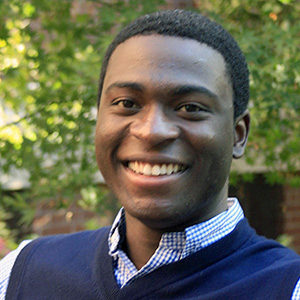 |
| Derrick Brown |
Derrick Brown, B.S. AE '16
After graduation, what's your next adventure?
I’m going to move to St. Louis to join the Boeing Company as a configuration design engineer. I will drive there on December 19 to look at property, but Boeing’s taking care of the moving van and putting me up while I look for a place. They’ve even gotten me a realtor.
What about your next adventure are you most excited about?
Mostly I’m looking forward to the opportunity to gain industry experience. Being a transfer student, I wasn’t able to get fully immersed in all of the hands-on research and other activities that other Tech students do. When I join Boeing, I’ll be able to get some more of that experience – creating a wind tunnel and running a wind tunnel test, doing some propulsion integration testing. Also, I come from a military family, and I know the Boeing project will be in the area of defense. That’ll put me in the front end of the technology that will be leading the military.
Did you have any previous co-op internship or research experience that helped you get to this point?
Since transferring here two years ago, I have had two internships with Boeing in St. Louis. My first one – summer of 2015 – I was an aerodynamics and propulsion engineer. I played a support role in the production process, which was great for the experience, but not what I want to do. The thing is, the whole experience was a door-opener. It gave me the opportunity to prove myself, to prove that I could work hard on a project and deliver. After I did that, I had more confidence in myself, so I asked to be placed into an internship that focused on my interests, which are in advanced design. That’s exactly where I landed in the summer of 2016. I was asked to design an aircraft that could replace the 810 WartHog. That was great. I got to do 3D modeling in X, a software modeling program.
How did your educational experience at Georgia Tech help you achieve your goal?
I gained a lot of knowledge here, but it’s the intuition that will help me excel at Boeing or anywhere I’d go. As a configuration design engineer, I had to be a jack-of-all-trades. I had to know something about structural analysis, aerodynamics, propulsion – things I learned at Georgia Tech. I had to know how to take those things out of the box and use them on the job. And my experience at Georgia Tech supported that all the way.
What advice would you give a student who was thinking about following your steps at Georgia Tech's aerospace engineering school?
Success starts with hard work. But it doesn’t end there. A lot of people are extremely intelligent, getting 4.0 GPAs for their work in classes. That takes hard work, and some talent, certainly, but what sets successful Tech grads apart is our willingness to innovate. By that, I mean you’ve got to know your material well enough to think outside the box, to put in the grind when the solution doesn’t jump out at you. I’ve talked to engineers in advanced design, and they tell me that the ‘human computer’ types – the ones who can run calculations in their heads – are great, but when it comes to solving problems, they need people who know their stuff well enough to step back, look at the big picture, and find an innovative solution. So, yeah, work hard because you’ll have to. But remember to step back and think about what you are doing, because that’s where you’ll find success.
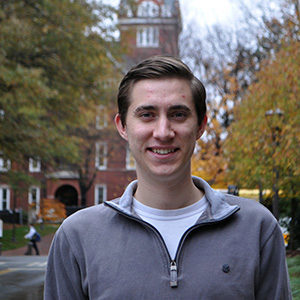 |
| James Clinton |
James Clinton, B.S. AE '16
After graduation, what's your next adventure?
I’m pursuing my master’s degree at Tech. I will be doing research with Dr. [Marilyn] Smith, mainly focusing on CFD, which is what I’ve already been working on.
What about your next adventure are you most excited about?
I’m most excited about getting independent work. I’ll be given an end goal and it'll be up to me see how we can get useful results. That’s an exciting challenge. And I look forward to getting a chance to publish and to present at professional conference.
Did you have any previous co-op internship or research experience that helped you get to this point?
A part of my undergraduate degree in science and engineering computation involved a course in numerical methods with Dr. Smith. That’s where I got my first chance to help with research. Working with Dr. Smith I attempted to use different aerodynamic models to speed up a lot of the data analysis that needed to be done. I also interned with AIG Aerospace doing insurance risk management, a very technical job that involved assessing the insurance risk of different aircraft.
How did your educational experience at Georgia Tech help you achieve your goal?
When I took a numerical methods class to fulfill a requirement I met Dr. Smith, who did such a great job showing how to apply the material to aerospace engineering. She designed the problems so that we were considering actual aerospace problems, not just pure logic. And the President’s Undergraduate Research Award (PURA) made it possible for me to work with Dr. Smith, doing research.
What advice would you give a student who was thinking about following your steps at Georgia Tech's aerospace engineering school?
I’d tell anyone coming to AE that you should give your all to your classes, but, then, after class, you should go see your professors during office hours because you might find out about an internship or a research opportunity that you wouldn’t know about. The professors will give you access to interesting problems because that’s what they’re funded to do – interesting problems
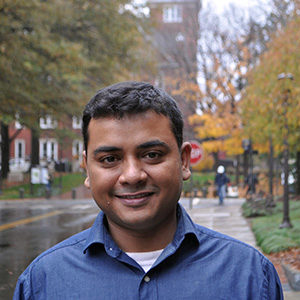 |
| Sayan Ghosh |
Sayan Ghosh, Ph.D. AE '16
After graduation, what's your next adventure?
I’m joining GE Global Research in Niskiyuna, New York. I’ll be a research engineer doing probabilistic design and risk analysis.
What about your next adventure are you most excited about?
Personally, speaking, my wife and I love traveling. We’ve never been to the northeast, so we’re excited. Professionally speaking I am waiting to apply my research to real problems and see the impact. The major difference between an industrial setting and academic research is that, in industry everything is limited by time and money, so you don’t have quite as much time for high-level inquiry. I spent almost two-thirds of my last internship just reviewing the data we’d collected from different sources to see what to extract. It’s only after that’s done that we can do statistical analysis. So it’s nice to see how industry and academics can combine to solve a problem.
Did you have any previous co-op internship or research experience that helped you get to this point?
I did my graduate research at ASDL focused on design methods. I did an internship at Airbus in the United Kingdom, applying probabilistic design methods to aircraft design. PDM looks at information based on parameters that are not under our control. It gives us insight on things like the cost of fuel, manufacturing costs and climate.
How did your educational experience at Georgia Tech help you achieve your goal?
Georgia Tech and ASDL have given me enough freedom to take different classes to see different approaches – computer science, machine learning, industrial systems design. That got me out of my comfort zone and helped me solve design problems that I wouldn’t have been able to tackle. Tech also exposed me to multiple industry leaders – Boeing, Airbus, NASA- which allowed me to see the diversity of design challenges.
What advice would you give a student who was thinking about following your steps at Georgia Tech's aerospace engineering school?
The doctoral degree is a waypoint – not the finish. A lot of time can be wasted in grad school searching for that one big idea. People come here, sometimes, to get that Nobel prize for their research. That seldom happens, but the time you waste looking for that one idea is unnecessary. The Georgia Tech AE School is a platform where you can do a great many things, so don’t just focus on one idea. Allow yourself to diversify your knowledge and your research.
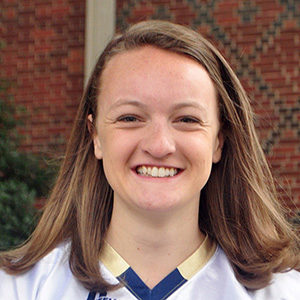 |
| Amanda Grubb |
Amanda Grubb, M.S.AE '16
After graduation, what's your next adventure?
I am coming right back here [to Tech] – probably the next day – to keep working with Dr. [Marilyn] Smith. Ultimately, I am targeting 2018 or 2019 to get my doctorate. All of my work is associated with CFD as it applies to rotorcraft. My research focuses on looking for ways to make CFD codes run more quickly, efficiently, and accurately.
What about your next adventure are you most excited about?
With quals done, and classes almost finished, I am looking forward to just focusing on my research. Instead of working in the lab from 9 to 5, then going home to do my [class] homework, I’ll be able to treat my research like a job – focusing on it exclusively. Going to class really breaks up your day and your concentration.
Did you have any previous co-op internship or research experience that helped you get to this point?
As an undergrad I did a SpaceX internship in propulsion - doing tests on second stage engine gas generation. I also did an internship with the Army Aeroflight Dynamics Directorate testing the implementation of FUN3D, a rotorcraft-specific CFD code that was created by NASA. Last summer I interned at NASA Langley, running CFD to get basic performance data for a new commercial aircraft design.
How did your educational experience at Georgia Tech help you achieve your goal?
Georgia Tech forced me to work hard. If you don’t work hard you don’t get anywhere. I’m pretty sure that at other schools you can get by with doing a lot less. That is just not the way it works here.
What advice would you give a student who was thinking about following your steps at Georgia Tech's aerospace engineering school?
You have to find a way to relax if you want to excel here. The stress will drive you crazy if you let it. I learned that from my undergraduate years, when I just didn’t sleep. When I started graduate school here, I started running. That’s my outlet now. I’ll be running the Disney Half Marathon in January. But I’ve also learned to plan out my relaxation, so, for instance, last fall I went to Germany, Austria and Ireland for the Georgia Tech-Boston College football game. It was a week away from Tech, and it was time well-spent
Avani Gupta, B.S. AE '16
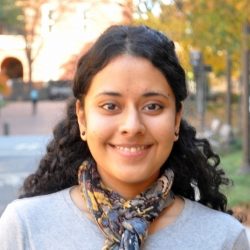 |
| Avani Gupta |
After graduation, what's your next adventure?
I will be coming back to Tech for grad school to work with Dr. [Marilyn] Smith in the CFD group.
What about your next adventure are you most excited about?
Grad school at Tech is going to be a very different experience from undergraduate. As an undergrad, you get the big picture and some tools. As a grad student doing research, I will be able to use those tools to go deeper, to learn how aerospace engineering can make an impact.
Did you have any previous co-op internship or research experience that helped you get to this point?
As an international student, I focused on research, where there are no restrictions. I have been involved in research since the summer of my sophomore year. I worked in Dr. Komerath’s Experimental Aerodynamics group, Dr. Sankar’s CFD lab, and last year, in the Non-linear Computational Aeroelasticity lab. I was also chosen to participate in a summer academy sponsored by Airbus at Delft University where several teams of students from around the world competed to design a UA system. Each team had to sell their idea to Airbus. And that’s where I realized that a good idea is just a good idea until you can sell it to someone else. That’s something that engineers have to understand.
How did your educational experience at Georgia Tech help you achieve your goal?
I have wanted to be an aerospace engineer since I was a child. It’s cliché but true. I always believed in myself, too, but now that it’s happening, it seems unreal. Georgia Tech helped me get here by encouraging me to take new opportunities, to push myself. There have been times I’ve been struggling, but I’ve never been pushed to the point where there was no hope. I learned to keep hope, maybe, because there were so many people showing me all along the way that there was a lot I could do if I kept learning. And those people – my professors – haven’t gotten to where they are without failures. They showed me that you can fail at some things and still succeed. And that gave me hope…for my Airbus academy, I needed help getting a visa. And I needed help arranging transportation. At one point, I didn’t think I could do it, but there were professors making calls for me, to make things happen. They were all about success.
What advice would you give a student who was thinking about following your steps at Georgia Tech's aerospace engineering school?
I would say that you can’t let the stress bog you down. There’s a lot to learn, and you probably can’t learn it all, but there’s always something that will work out. And there are usually people around you who will help you succeed. School is like a sinusoidal wave – it has its ups and downs. You have to get used to it. Because you can’t be happy about the ups if there are no downs.
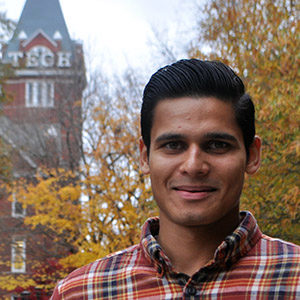 |
| Dylan Monteiro |
Dylan Monteiro, B.S.AE '16
After graduation, what's your next adventure?
I will begin my master’s program studying propulsion and energy under Professor [Dimitri] Mavris.
What about your next adventure are you most excited about?
I’m looking forward to learning about a particular problem– aircraft propulsion and system design – and then specializing my research to come up with unique results. Ultimately, I want to go into industry, where I will be able to design a propulsion system and integrate it into an aircraft.
Did you have any previous co-op internship or research experience that helped you get to this point?
I co-opped with BorgWarner Turbo Systems in their aerodynamic group where I did a lot on simulation of the compressors and a lot of design optimization. I also co-opped last summer at Rolls Royce in Indianapolis, where I worked on CFD [computational fluid dynamics] codes and testing commercial CFD.
How did your educational experience at Georgia Tech help you achieve your goal?
AE helped me to see what it is like to be an aerospace engineer – what aspects of the field I like, what I don’t like. The work experience was really crucial. After my first co-op I realized I should take really good notes and keep my text books because they actually use this stuff on the job: they don’t ask you to plug something into a computer program to get an answer. They expect you to have a basic understanding of the concepts and create an answer. Tech also gave me a foundation for learning new things on the job– stuff you would not learn in class. On my co-ops I had to learn 10 different types of software– proprietary stuff that you need to know to do the job. There’s no secret to that and no shortcuts: I had to practice it until it became easy.
What advice would you give a student who was thinking about following your steps at Georgia Tech's aerospace engineering school?
My biggest regret was not getting involved in research sooner. I would tell anyone coming in to get to know the professors so you can get to know what their research interests are. Then see what you need to do to get involved in research that interests you. Also: go to the career fairs, even if you are not ready to work, so you can get a basic understanding of the interview process and what it’s like to apply for jobs. Apply for anything that looks interesting, too. And, use what you learn on your internships to help you understand what you are learning in class. They are related.
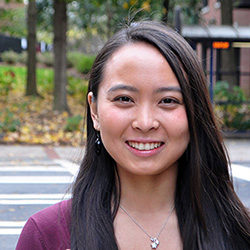 |
| Nana Obayashi |
Nana Obayashi, M.S.AE '16
After graduation, what's your next adventure?
I wanted a job that would let me impact the final product design. I’ve been fielding offers throughout the fall, but I have decided to go to Volvo Group Trucks Technology, which has offered me a slot in its Engineering Graduate Program. That program has rotations which will allow me to travel to different locations around the world – Sweden, France, India. It does not start until September, but they are letting me come early. They are giving me a position in the Aerodynamics Feature Team, which supports analysis and helps component development for reducing greenhouse gases.
What about your next adventure are you most excited about?
I am most excited that I found a position that will fully use the skills I learned in school. I wanted to have a position that would allow me to have a direct impact on the final design and I think that’s what I will have with Volvo. I don’t think that’s normally the case with entry-level jobs.
Did you have any previous co-op internship or research experience that helped you get to this point?
I had internships with BMW that showed me what it’s like to be in industry and auto manufacturing in particular. I also had internships with Japan’s space agency and with Dr. Katsuro Inoue at Osaka University. A lot of what I focused on in graduate school, though, was research. I did CFD research with Dr. [Lakshmi] Sankar. That introduced me to aerodynamics and fluid dynamics, which I really enjoyed.
How did your educational experience at Georgia Tech help you achieve your goal?
I think at Georgia Tech I got to do so many things that were not academics – student organizations like SAESAC, SGT, Yellow Jackets Flying Club, and AHS – that all helped me to grow as a person. And that helps when you go on interviews, because employers want to see you are capable of interacting with others. In my classes and in my labs I got exposed to so many things, too – design, analysis, and engineering projects. And I was able to study abroad, too – at GT Lorraine and in a language program in Paris and Nice, France. All of these experiences, I believe, opened doors for me.
What advice would you give a student who was thinking about following your steps at Georgia Tech's aerospace engineering school?
Of course academics are important to focus on, but it’s okay to be a little bit greedy - you should try to explore whatever lets you be a fully balanced person. I started out with just one focus – to do well in school – but then I let myself have unrelated hobbies, to keep myself balanced. So, when I started my graduate program, I took up classical ballet - something I studied when I was younger but dropped. That was what I did to completely remove myself from AE, and it seems to have worked. Success is not something you can plan entirely. It’s a happy accident that occurs after you put your heart into what you are doing.
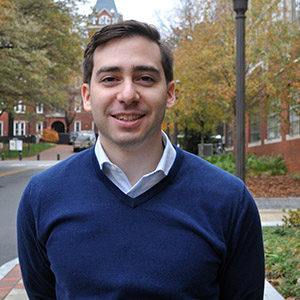 |
| Adam Siegel |
Adam D. Siegel Ph.D. AE '16
After graduation, what's your next adventure?
I am moving to Indianapolis to take a job in the computational methods group at Rolls Royce.
What about your next adventure are you most excited about?
I’ve only really been involved in research so it’ll be pretty cool to work for a company that produces a product. To see the results of my work in action – turning research into something that will fly people around – that’s pretty cool.
Did you have any previous co-op internship or research experience that helped you get to this point?
Before I got to Tech I earned two bachelor’s degrees, one in computational physics and the other in mechanical engineering. I had the honor of working with professors who were very high profile in those areas. When I came here I came because I love aerospace and I got introduced to all aspects of engines as a part of my research. My second year here, I did an internship in the computational methods group at Rolls Royce and it was awesome. I loved the people and the work, and I was invited back for two more rotations. After the third rotation they said ‘we want you to finish your PhD and come back here.’ So I signed my job contract two years ago.
How did your educational experience at Georgia Tech help you achieve your goal?
Georgia Tech’s AE School has a close connection with industry and government employers which helped me to find Rolls Royce. The Aerospace Systems Design Lab where I work has a great External Advisory Board that had a connection with Rolls Royce that got me my first exposure there. Two very sharp guys from Rolls Royce were on my [dissertation] committee and they gave me great insight. And Dr. Mavris is awesome. He’s incredibly busy but he always knows what people are doing – in their research and in their lives. You may not talk to him all the time because he is so busy, but if you go into his office and tell him you have to talk to him and he says he’s busy right then, you’ll get that call from him when he’s in Bolivia. He is tough, but he’ll never push you harder than you are capable of doing. And he knows what you are capable of doing, even when you’re not so sure.
What advice would you give a student who was thinking about following your steps at Georgia Tech's aerospace engineering school?
The advice I’d give is ‘Don’t take “no” for an answer.’ When I was an undergrad, I said I wanted to major in engineering and physics. People said ‘No, you’ll never have the time,’ but I did. I took independent studies to make up the difference. At Georgia Tech, I never heard Doc [Professor Mavris] say ‘no.’ He’d tell me to be careful, but if I had a dream, he would just say do what you need to do to be successful. And he knows how to push each of his students to be successful.
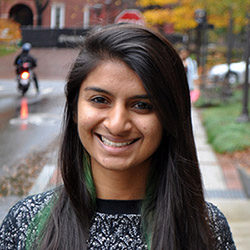 |
| Lubna Zubair |
Lubna Zubair, B.S. AE '16
After graduation, what's your next adventure?
I’m taking the spring to travel (to South Africa), do an internship (with Blue Origin in Seattle) and apply to grad school for the fall.
What about your next adventure are you most excited about?
I am most excited about traveling to new locations where I’ve never been before and to be productive in the field. I know I will be starting grad school somewhere in the fall so it will be great to not have to worry about homework for a good solid eight months.
Did you have any previous co-op internship or research experience that helped you get to this point?
I interned at JPL in the summer of 2015. It was a great experience because I got to meet people in different divisions where I could ask about their hardware, their software, their mission operations. My mentor at JPL actually set up lunches with people who could give me different perspectives. I also did a summer internship at Orbital ATK where I focused on systems engineering, flight software, and control systems. Again, it was fun because I got to work in all three areas, and I definitely fell in love with control systems engineering. That’s what I’ll focus on in grad school. I got to work on an actual simulator and to write code for an antenna modeling system that they still use. At Tech, I also worked on the RECONSO cubesat and the Prox 1 cubesat.
How did your educational experience at Georgia Tech help you achieve your goal?
I definitely think undergrad research made a difference. With RECONSO, I got to develop skills you don’t get in regular AE classes – in computer science and in ECE. In both cases, I had to teach myself new skills and work at the same time – like an actual mission. I also had the experience of running the AeroHack, a hack-a-thon that drew in industry sponsors and students. It was a great experience.
What advice would you give a student who was thinking about following your steps at Georgia Tech's aerospace engineering school?
Actually, my most important advice would be: get a good study group, because you cannot do this all by yourself. You need friends who’ll sit down and help you work through problems you get in classes. You can’t just sit yourself in your dorm room and do it yourself. I’d also say take advantage of the opportunity to travel. I did a semester in Australia and New Zealand.